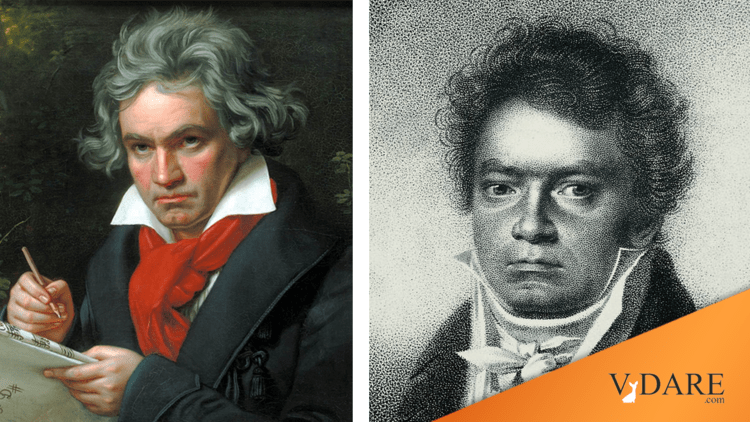


By Steve Sailer
03/22/2023
Earlier(2020): GUARDIAN: Was Beethoven Black?
African-American Studies departments were largely the results of student riots on campus during the tumultuous late 1960s. By the first round of political correctness around 1990, they were starting to influence the campus climate. But their flavor of bad ideas were subtly different than the current ones.
While black activist academics are now increasingly female and thus focused on topics like trauma, their hair, and their hair trauma, in the fun old days of guys like Leonard “Sun People” Jeffries and Molefi Asante, African-American Studies faculty tended to be male hoteps of the We Were Kings variety, interested in claiming greatness for the black race.
Because Beethoven had famously unruly hair, was a musician, and was immensely famous, he was a popular figure to claim as black a generation ago.
From The New York Times science section:
DNA From Beethoven’s Hair Unlocks Medical and Family Secrets
By analyzing seven samples of hair said to have come from Ludwig van Beethoven, researchers debunked myths about the revered composer while raising new questions about his life and death.
By Gina Kolata
March 22, 2023
Gina Kolata is an old-timer from the Nicholas Wade glory days of the NYT Science section.
… Within three days of Beethoven’s death, not a single strand of hair was left on his head.
Ever since, a cottage industry has aimed to understand Beethoven’s illnesses and the cause of his death.
Now, an analysis of strands of his hair has upended long held beliefs about his health. The report provides an explanation for his debilitating ailments and even his death, while also raising new questions about his genealogical origins and hinting at a dark family secret.
The paper, by an international group of researchers, was published Wednesday in the journal Current Biology.
It offers additional surprises: A famous lock of hair — the subject of a book and a documentary — was not Beethoven’s. It was from an Ashkenazi Jewish woman.
The study also found that Beethoven did not have lead poisoning, as had been widely believed. Nor was he a Black man, as some had proposed.